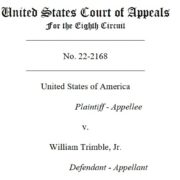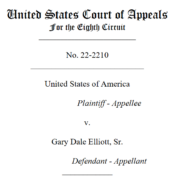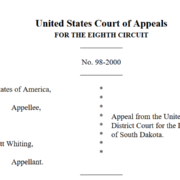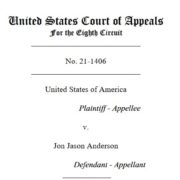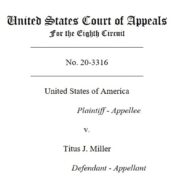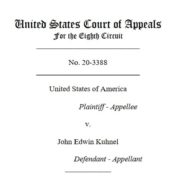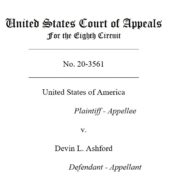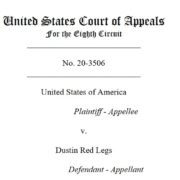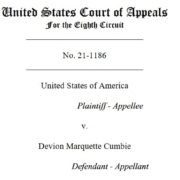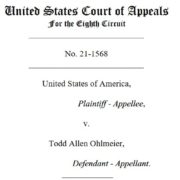Fourth Amendment Protections: Examining reasonable suspicion, the Miranda warning exception, and search warrant validity
/in Child Pornography, Federal Sex Crimes /by socialIn affirming the district court’s ruling, the court emphasized the role of reasonable suspicion, the public safety exception to Miranda, and the establishment of probable cause, thereby providing crucial clarifications on these key legal aspects.
Eighth Circuit Upholds Conviction for Possession of Child Pornography on Computer Disks
/in Child Pornography /by socialUnderstanding Downward Variance in Sentencing in Child Pornography Cases
/in Child Pornography /by Cantin MynarichTo determine whether a downward variance was appropriate in child pornography cases, the court will apply the approach proposed by the United States Sentencing Commission in Chapter 12(C) of its 2012 Child Pornography Report to “differentiate between offenders based on the content of the pornography at issue.”
Understanding Waiver of Appellate Rights in Child Pornography Cases
/in Child Pornography /by Cantin MynarichWhether a valid waiver of appellate rights occurred is a question of law that courts will review de novo. The question in this case is whether Defendant “knowingly and expressly” waived any and all rights to appeal his conviction and sentence, except for a claim of ineffective assistance of counsel.
Understanding Conditions of Probation in Child Pornography Cases
/in Child Pornography /by Cantin MynarichThe conditions of probation prohibited Defendant from possessing sexually explicit material – including child pornography, accessing the internet or electronic devices without permission, using nonapproved social media or chat websites, and consuming alcohol or drugs. A standard condition of probation for child pornography-related crimes required Defendant to “submit at any time to an unannounced visit and/or search of the offender’s person, vehicle or premises by the agent/designee.”
Circumstantial Evidence in Child Pornography Cases
/in Child Pornography /by Cantin MynarichIn Child Pornography Cases Indirect Evidence Can Lead to Conviction. The defendant argues there was insufficient evidence to support his conviction for production of child pornography. The defendant argues that while the minor victim testified Ashford requested and she sent sexually explicit pictures of herself to his Facebook Messenger account, no direct evidence showed he actually sent and received those communications.
Challenging Expert Testimony in Child Pornography Cases
/in Child Pornography /by Cantin MynarichExpert testimony can play an important part in child pornography cases. In this case, the defendant contends that the prosecution’s expert lacked the qualifications necessary to provide an expert opinion as to identity-based upon the comparison of finger and knuckle creases as shown in the two sets of photos. The defendant claims that the government’s expert instead used a generic method unreliable for the comparison of finger and knuckle creases.
Examining Defense Witness Testimony in Child Pornography Cases
/in Child Pornography /by Cantin MynarichDefendant argued that the hearsay statement contains sufficient circumstantial guarantees of trustworthiness to be admissible.
Determining Indigency in Child Pornography Cases
/in Child Pornography /by Cantin MynarichIn child pornography cases, the determination of indigency is a determination for the district court to make in the first instance, in light of true facts, and is subject to review for clear error.
Blog
 Understanding License Revocation and DWI Arrest TimelinesFebruary 17, 2024 - 9:02 pm
Understanding License Revocation and DWI Arrest TimelinesFebruary 17, 2024 - 9:02 pm Felony DWI: Analyzing Proof Requirements in Habitual Offender CasesFebruary 5, 2024 - 12:39 pm
Felony DWI: Analyzing Proof Requirements in Habitual Offender CasesFebruary 5, 2024 - 12:39 pm Applying Equal Protection Analysis in Limited Driving Privilege CasesJanuary 24, 2024 - 4:56 pm
Applying Equal Protection Analysis in Limited Driving Privilege CasesJanuary 24, 2024 - 4:56 pm Understanding the Impact of Probable Cause in DWI CasesJanuary 3, 2024 - 7:27 pm
Understanding the Impact of Probable Cause in DWI CasesJanuary 3, 2024 - 7:27 pm Sweat Patch Testing on Supervised Release: Examining U.S. v. BonaparteNovember 21, 2023 - 11:04 am
Sweat Patch Testing on Supervised Release: Examining U.S. v. BonaparteNovember 21, 2023 - 11:04 am
Our Offices

2560 S. Glenstone Ave., Suite C
Springfield, MO 65804
Phone: 417-831-6363
Fax: 417-831-7373
The choice of a lawyer is an important decision and should not be based solely upon advertisement.

